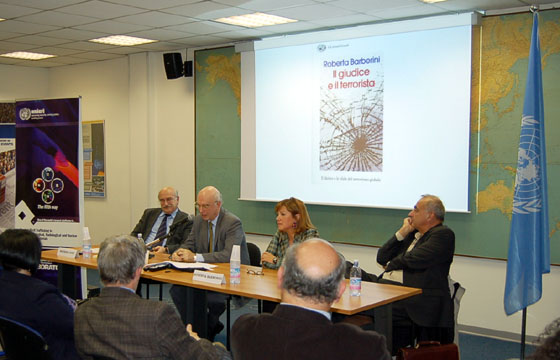

News
"The Judge and the Terrorist"
The International Law and the new challenge of Terrorism
Turin, 4 November 2008. Roberta Barberini General Prosecutor and former UN expert on international law, presented her new book titled "Il Giudice e il Terrorista" at the UNICRI HQ in Turin.
The essay, published by Einaudi, proposes a double-pronged approach: judicial and the diplomatic. It deals with the challenges posed by terrorism to international law and the legal system of democratic states.
Existing concepts of rights, law, and liberty, as defined by the International Community, no longer respond to contemporary needs and emergencies. The challenges posed by an adversary who in not answerable to a government, electorate or any institutional framework, cannot be met by the pre-9/11 approach. New, solid strategies which respect the liberty of citizens but are also tough on the real criminals are needed to overcome these obstacles.
Roberta Barberini's book was introduced by UNICRI Director Mr. Sandro Calvani, who stressed the crucial importance of having new technical tools to prevent and tackle the danger of such intranational organizations. Moreover, according to the diplomatic approach, a threat such as the one embodied by trans-national criminal organizations must be faced with a shared strategy at an international level.
Also attending the open doors meeting were Giovanni De Luna, Professor of Contemporary History at the University of Turin, and General Prosecutor Maurizio Laudi. They argued for the necessity of clear definitions, as the line between terrorist and freedom fighter has become increasingly blurred since the end of the cold war. They also stressed the importance of maintaining stricter controls on these individuals.
The latest subject has provoked debate about the existing contrast between the necessity for the judiciary to have stronger legislative tools to stop intranational terrorism, and the democratic necessity to ensure individual rights to privacy. A contentious, sometimes philosophical topic, to which Barberini's work tries to give some responses.

Turin, 4 November 2008. Roberta Barberini General Prosecutor and former UN expert on international law, presented her new book titled "Il Giudice e il Terrorista" at the UNICRI HQ in Turin.
The essay, published by Einaudi, proposes a double-pronged approach: judicial and the diplomatic. It deals with the challenges posed by terrorism to international law and the legal system of democratic states.
Existing concepts of rights, law, and liberty, as defined by the International Community, no longer respond to contemporary needs and emergencies. The challenges posed by an adversary who in not answerable to a government, electorate or any institutional framework, cannot be met by the pre-9/11 approach. New, solid strategies which respect the liberty of citizens but are also tough on the real criminals are needed to overcome these obstacles.
Roberta Barberini's book was introduced by UNICRI Director Mr. Sandro Calvani, who stressed the crucial importance of having new technical tools to prevent and tackle the danger of such intranational organizations. Moreover, according to the diplomatic approach, a threat such as the one embodied by trans-national criminal organizations must be faced with a shared strategy at an international level.
Also attending the open doors meeting were Giovanni De Luna, Professor of Contemporary History at the University of Turin, and General Prosecutor Maurizio Laudi. They argued for the necessity of clear definitions, as the line between terrorist and freedom fighter has become increasingly blurred since the end of the cold war. They also stressed the importance of maintaining stricter controls on these individuals.
The latest subject has provoked debate about the existing contrast between the necessity for the judiciary to have stronger legislative tools to stop intranational terrorism, and the democratic necessity to ensure individual rights to privacy. A contentious, sometimes philosophical topic, to which Barberini's work tries to give some responses.




